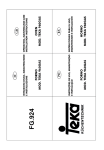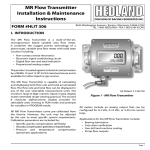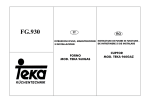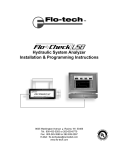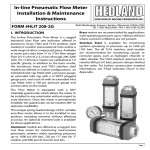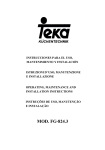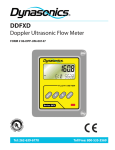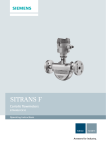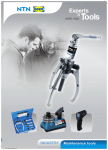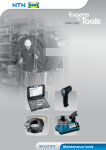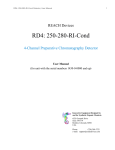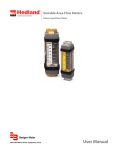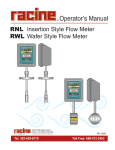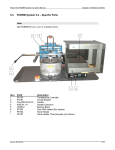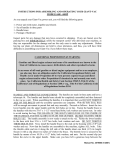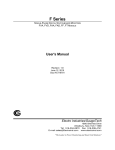Download Installation Instructions For EZ-View® Flow Meter and EZ
Transcript
Installation Instructions For EZ-View ® Flow Meter and EZ-View ® Flow-Alert™ Flow Meter FORM # HLIT 300 DIVISION OF RACINE FEDERATED INC. 8635 Washington Avenue • Racine • Wisconsin 53406-3738 USA TEL 800-HEDLAND • FAX 800-CHK-FLOW I. INTRODUCTION The EZ-View series flow meter is a rugged, low-cost direct reading industrial class flow meter that is simple to install. It can be mounted (installed) in any position from vertical to horizontal without costly flow straighteners or other special plumbing. Constructed of high impact polysulfone plastic, the EZ-View product line offers excellent structural integrity and chemical compatibility with a wide range of industrial chemicals. EZ-View flow meters provide instantaneous, directreading flow rate measurement of liquids in closed piping systems. The transparent polysulfone plastic body allows visual inspection of the fluid condition as well as viewing of the internal flow indicator relative to a calibrated flow scale. See Figure 1. EZ-View meters do not require electrical connections for operation, and provide measurement by creating a predictable differential pressure across a sharp-edged orifice that is located in the piston assembly. II. OPERATING PRINCIPLE The EZ-View series flow meter is a piston-type variable area flow meter that uses a sharp-edged annular orifice, formed between an open-centered piston and a tapered metering cone. The piston is held in a “no-flow” position at the base of the cone by a precision retention spring. As flow in the pipe increases, the differential pressure correspondingly increases across the piston orifice, and moves the piston/flow indicator against the spring. The greater the flow rate, the further the piston moves along the tapered metering cone. The flow rate is measured by viewing the red indicator ring, mounted on the piston, relative to a graduated flow scale located on the transparent flow meter body. See Figure 2. End Fitting Body Spring Limit Indicator Metering Cone Serrated Rail Flow Scale Piston Assembly Magnet (Switching Models Only) Flow Indicator Pressure Seal Figure 1. EZ-View Flow Meter The unique design allows the EZ-View meter to be mounted in any orientation–horizontal, vertical, upside down, etc.–without sacrificing measurement performance. Flow straighteners, located in the inlet and outlet, allow the flow meter to be less sensitive to turbulent flow conditions. Liquid measurements are provided in GPM (Gallons per Minute) and LPM (Liters per Minute). 80 Flow Rate Indicator 16 12 60 40 8 4 GPM 20 LPM Figure 2. Flow Rate Indicator Page 1 EZ-View Flow Meter and EZ-View Flow-Alert Flow Meter Installation & Maintenance Instructions III. SPECIFICATIONS Accuracy • ±5% of full scale Repeatability • ±1% Pressure Rating • 325 PSI (22.4 bar) Maximum • Meters with Type 1 PVC fitting subject to normal PVC system ratings Temperature Range • +32 °F to +250 °F (0 °C to +121 °C) • +32 °F to +140 °F (0 °C to + 60 °C) for meters with Type 1 PVC fittings Materials (wetted) • Body 1/2", 3/4" & 1" sizes 1-1/2" & 2" sizes • Piston • Cone 1/2", 3/4" & 1" sizes 1-1/2" & 2" sizes • Spring • Retaining Rings • Seals • Indicator Ring • Limit Indicators • Magnet • Fittings Pressure Drop See Pressure Drop Charts on page 14 Polysulfone or Radel® Radel® Polysulfone Polysulfone or Radel® Polysulfone T300 Stainless Steel PH15-7MO Stainless Steel Buna-N Buna-N Polypropylene Strontium Ferrite (switching units only) C360 Brass, PVC or T303 Stainless Steel Materials (non-wetted) • Limit Indicator • Scale Fittings/Threads • NPT ANSI/ASME B1.20.1 • BSPT ISOR7 • BSPP ISO228 Polypropylene Polyester Material Compatibility • See Fluid Selection Chart on page 13 Calibration Fluid • Oil 0.876 specific gravity, 32 cSt viscosity • Water 1.0 specific gravity, 1.0 cSt viscosity Dimensions 1.78 (45.2) 3.25 (82.5) BODY FLATS LENGTH W ® 90 80 ! 60 40 20 LPM 1.37 (34.8) BODY FLATS LENGTH CAUTION 1. Only use Teflon tape to seal threaded fittings. DO NOT use pipe dope. 2. DO NOT sweat fit adaptor fittings into a system while mounted to the EZ-VIEW meter. 1/2", 3/4" & 1" Sizes Size & Type Material Connection 1/2" NPTF & BSPT Brass & SS Female 3/4" NPTF & BSPT Brass 3/4" & 1" Sweat 1-1/2" & 2" Sizes Size & Type Material Connection in (mm) Fitting Flats in (mm) in (mm) Fitting Flats in (mm) 7.75 (196.8) 1.50 (38.1) 1-1/2" NPTF & BSPP Brass Female 8.72 (221.5) 3.00 (76.2) Male 8.25 (209.5) 1.50 (38.1) 1-1/2" Socket Weld PVC Socket Weld 12.72 (323.1) N/A Brass Brass Male Sweat 7.75 (196.8) 1.50 (38.1) 2" NPTF & BSPP Brass Female 8.72 (221.5) 3.00 (76.2) 1" NPTF Polysulfone Male 5.25 (133.3) N/A 2" Socket Weld PVC Socket Weld 11.48 (291.6) N/A 1" Nominal PVC Socket Weld 8.46 (214.9) 1.54 (39.1) -- -- -- -- -- 1" NPTF PVC Male 8.86 (225.0) 1.50 (38.1) -- -- -- -- -- Page 2 Length Length EZ-View Flow Meter and EZ-View Flow-Alert Flow Meter Installation & Maintenance Instructions IV. INSTALLATION CAUTION Don’t - Use pipe wrenches on the flow meter body. To avoid scarring or otherwise damaging the external surface, use an open-end wrench on the integral hex flats during installation. This unit should be installed and serviced by technically qualified personnel trained in maintaining industrial class flow instrumentation and processing equipment. Don’t - Subject the flow meter to back pressure or back flow. The flow meter will operate as a “leaky” check valve when subjected to reverse flow, but can be damaged if the reverse hydraulic horsepower is too great. CAUTION Don’t - Install the flow meter on systems with large degrees of particulate contamination. Minimum filtration of 200 mesh (74 micron) is recommended for troublefree operation. Read instructions thoroughly before installing the unit. If you have any questions regarding product installation or maintenance, call your local supplier for more information. Installation Recommendations The flow meter is a simple device to install. However, the following measures are recommended for reliable, trouble-free operation: CAUTION Liquid pipe sealants, PVC/CPVC primers and PVC/ CPVC cements contain solvents that are not compatible with polysulfone plastic. Allowing liquid pipe sealants to contact the plastic flow meter will result in weakening of the flow meter body and potentially cause fracturing under pressure. Don’t - Allow liquid pipe sealant, PVC/CPVC primer or PVC/CPVC cements to come into contact with the plastic flow meter. These contain solvents that are not compatible with polysulfone plastic and will result in the flow meter body weakening and potentially fracturing under pressure. If a pipe sealant is required, use of Teflon® tape is recommended. Don’t - Install the flow meter in piping systems that are not aligned or properly supported. Don’t - Connect the flow meter male plastic NPT fittings to female metal NPT couplings. Differences in coefficients of expansion between metals and plastics can cause the plastic flow meter body to crack. Utilize a female-to female plastic pipe coupling to connect metal pipe to the plastic flow meter. Don’t - Install O-ring seals that have not been lubricated. Piping (Plumbing) CAUTION To avoid unnecessary pipe flexing that could cause structural stress on the flow meter body, independent support located as near as possible to the inlet and outlet of the meter should be used to isolate the meter from the piping system. Failure to provide this support could reduce the life of the meter. Piping should be properly aligned with the meter inlet and outlet to minimize structural stress on the plastic meter body. Special attention should be given to this effort if higher operational pressures and/or temperatures are anticipated. Piping should be firmly supported by external mounting brackets, both upstream and downstream from the meter to avoid any pipe flexing that could reduce the life of the meter. 1. If the flow meter inlet or outlet are to be rigidly mounted, and the opposing port is to be connected to a flexible hose, the end connected to the flexible hose MUST be rigidly mounted. 2. This unique design does not require special plumbing or accessories to stabilize turbulent flow. Flow meters can be installed immediately adjacent to 90° elbows or other components, providing system design flexibility. 3. A 200 mesh (74 micron) or better filtration is required to assure reliable performance. Page 3 EZ-View Flow Meter and EZ-View Flow-Alert Flow Meter Installation & Maintenance Instructions LPM 20 4 GPM 8 12 WATER 60 40 90 80 16 20 Mounting Orientation The meter can be installed to operate in any position. Flow Direction Indicator 24 Flow Direction These meters only accept flow in one direction. Make sure to align the Flow Arrow, located on the bottom of the meter’s flow scale, in the same direction as the anticipated line flow. See Figure 3. Figure 3. Flow Direction Indicator H621-XXX 1" NPT Models (See Figure 4) 1. Apply a single layer of Teflon® tape to the male NPT threads of the flow meter. 2. Thread the flow meter inlet into a 1" NPT plastic, female pipe coupling. 5. Thread a 1" NPT plastic pipe coupling to the outlet connection of the flow meter. Stack a pipe nipple and half of a pipe union onto the pipe coupling. Tighten the assembly as required. 3. Thread the flow meter and coupling onto the inlet pipe and hand tighten. Make sure the flow direction arrow on the flow meter corresponds with the system flow direction. See Figure 3. 6. Install the other half of the pipe union to the outlet pipe and connect the union halves together. 4. Place an open-end wrench on the flow meter body hex and place a pipe wrench on the metal mating pipe. Tighten until snug. DO NOT overtighten. Make sure the flow meter scale is oriented for convenient viewing. DO NOT back off/unscrew fittings to rotate scale for better viewing. 8. Slide the limit indicators to point to appropriate positions on the flow meter scale. To remove the limit indicators, slide them fully towards the flow meter outlet. 7. Piping should be supported and aligned properly to avoid placing stress on the flow meter body. Figure 4. Model H621-XXX 1" NPT Models Installation Page 4 EZ-View Flow Meter and EZ-View Flow-Alert Flow Meter Installation & Maintenance Instructions H628-XXX 1", H636-XXX 1-1/2" and H619-XXX 2" PVC with Socket Weld Models (See Figure 5) 1. Remove the two end fittings from the flow meter. Lubricate the O-rings and install the fittings onto the flow meter. CAUTION Liquid pipe sealants, PVC/CPVC primers and PVC/ CPVC cements contain solvents that are not compatible with polysulfone plastic. Allowing liquid pipe sealants to contact the plastic flow meter will result in weakening of the flow meter body and potentially cause fracturing under pressure. 2. Prepare the flow meter PVC fittings and PVC pipe couplings with PVC cleaner/solvent. 3. Apply a thin layer of PVC glue to the PVC flow meter fittings. Orient the meter during curing to ensure that excessive glue will not run into or onto the flow meter. Connect all PVC glue joints by inserting the pipes fully into their mating components and twisting 1/8 turn to guarantee adhesion. Allow sufficient drying time. 4. Using the method outlined in steps 2 & 3, apply 1/2 of the PVC union to the flow meter outlet fitting. 5. Install the other 1/2 PVC pipe union to the outlet pipe. 6. Make sure the flow direction arrow on the flow meter corresponds with the system flow direction. See Figure 3 on page 4. Lubricate the union O-ring and connect the union together. 7. Piping should be supported and aligned properly to avoid placing stress on the flow meter body. 8. Slide the limit indicators to point to appropriate positions on the flow meter scale. To remove the limit indicators, slide them fully towards the flow meter outlet. NOTE: To replace meter body order P.N. H622-XXX. 1" Union 1" Figure 5. Model H628-XXX 1", H636-XXX 1-1/2" & H619-XXX 2" PVC Socket Weld Models Installation H620-XXX Brass Sweat Fitting Models (See Figure 6 on page 6) 1. Remove both brass fittings from the flow meter inlet and outlet. Remove O-rings from the fittings. 2. Apply solder flux to the flow meter brass fittings and mating pipe surfaces. 3. Place the brass hex coupler onto the pipe with the thread facing the flow meter. Slide the brass sweat fitting onto the prepared pipe. 4. Sweat the fittings onto the pipe. DO NOT apply heat to the brass flow meter fitting with the plastic flow meter body or seals attached to the fitting. 5. Repeat steps 3 & 4 for the other flow meter fitting. Allow fittings to cool. 6. Lubricate the two O-rings removed in step 1. Place the O-rings onto the brass fittings. 7. Place the flow meter in between the two installed brass fittings. Make sure the flow direction arrow on the flow meter corresponds with the system flow direction. See Figure on page 4. Thread the two brass hex couplers into the flow meter body. 8. Rotate the flow meter body so the scale can be conveniently viewed. Tighten the hex couplers. Typically, only hand tightening is required. 9. Piping should be supported and aligned properly to avoid placing stress on the flow meter body. 10. Slide the limit indicators to point to appropriate positions on the flow meter scale. To remove the limit indicators, slide them fully towards the flow meter outlet. NOTE: To replace meter body order P.N. H622-XXX. Page 5 EZ-View Flow Meter and EZ-View Flow-Alert Flow Meter Installation & Maintenance Instructions Figure 6. Model H620-XXX Brass Sweat Fitting Models Installation All Models with Male, Metal or PVC Threaded End Fittings (See Figure 7) 1. Remove both fittings from the flow meter inlet and outlet. Remove O-rings from the fittings. 2. Apply Teflon® tape to the male pipe thread connections. 3. Place the brass or stainless steel hex coupler onto the pipe with the threads facing the flow meter. 4. Thread the flow meter fittings onto the mating pipe. 5. Tighten fittings by placing an open-end wrench onto the fitting and a pipe wrench onto the mating pipe. 6. Repeat steps 3-5 for the other flow meter fitting. 7. Lubricate the two O-rings removed in step 1. Place the O-rings onto the threaded fittings. 8. Place flow meter between the two installed fittings. Make sure the flow direction arrow on the flow meter corresponds with the system flow direction. See Figure 3 on page 4. Thread the two hex couplers onto the flow meter body. 9. Rotate the flow meter body such that the scale can be conveniently viewed. Tighten hex couplers. Typically, only hand tightening is required. 10. Piping should be supported and aligned properly to avoid placing stress on the flow meter body. 11. Slide the limit indicators to point to appropriate positions on the flow meter scale. To remove the limit indicators, slide them fully towards the flow meter outlet. NOTE: To replace meter body order P.N. H622-XXX. Figure 7. All Models w/Male, Metal or PVC Threaded End Fittings Installation Page 6 EZ-View Flow Meter and EZ-View Flow-Alert Flow Meter Installation & Maintenance Instructions All Models with Female, Metal Threaded End Fittings (See Figure 8) 1. Apply Teflon® tape to the male pipe thread connections. 2. Thread the inlet of the flow meter onto the appropriate pipe connection. Make sure the flow direction arrow on the flow meter corresponds with the system flow direction. See Figure 3 on page 4. 3. Tighten flow meter connection by placing an open-end wrench on the flow meter metal connection adjacent to the pipe that is being attached. Tighten until snug. Make sure flow meter scale is oriented for convenient viewing. DO NOT overtighten. DO NOT back off/ unscrew to rotate scale for better viewing. 4. Install a union fitting at the outlet end of the flow meter. CAUTION Do not tighten the flow meter by wrenching from the opposite fitting, as the meter body could crack. 5. Piping should be supported and aligned properly to avoid placing stress on the flow meter body. 6. Slide the limit indicators to point to appropriate positions on the flow meter scale. To remove the limit indicators, slide them fully towards the flow meter outlet. NOTE: To replace meter body order P.N. H622-XXX. Figure 8. All Models w/Female, Metal Threaded End Fittings Installation Page 7 EZ-View Flow Meter and EZ-View Flow-Alert Flow Meter Installation & Maintenance Instructions V. FLOW-ALERT SWITCH OPTIONS NOTE: All Flow-Alert switches are magnetically triggered. It is not possible to add a switch to the basic meter if it was not originally ordered with the switching magnet. Flow-Alert Latching Limit Switch The AC and DC powered Flow-Alert modules consist of a relay circuit housed in a sealed plastic enclosure. The modules have a normally open, dry relay contact that can be used to directly control alarms, warning lights, relays, or interface to a PLC. The relay will be latched on as the magnet inside the flow meter passes by the module, and remain latched on until the magnet passes in the other direction, or power is interrupted. See Figure 9. The setpoint is adjustable from 0-100% of full scale. Flow meters can be equipped with one latching limit switch, either AC or DC. On 3% Deadband Switch Contacts Off 0 Full Scale Switch Contacts 90 80 ! 60 40 20 LPM FLOW DIRECTION 15 - 25% Of Scale On Off 0 Full Scale CAUTION 90 80 ! 60 Figure 9. Latching Switches 40 FLOW DIRECTION 20 LPM 1. Only use Teflon tape to seal threaded fittings. DO NOT use pipe dope. 2. DO NOT sweat fit adaptor fittings into a system while mounted to the EZ-VIEW meter. CAUTION 1. Only use Teflon tape to seal threaded fittings. DO NOT use pipe dope. 2. DO NOT sweat fit adaptor fittings into a system while mounted to the EZ-VIEW meter. Figure 10. Reed Switches Flow-Alert Reed Limit Switch The reed switch Flow-Alert modules are available in three forms: Form A (normally open), Form B (normally closed), and Form C (single-pole, double throw). Reed switches are housed in a sealed plastic enclosure for environmental protection. The reed switch modules do not provide a latching function like the AC and DC powered units. When the magnet inside the flow meter comes within proximity of the module, the reed switch will change state. See Figure 10. The setpoint is adjustable from 0-100% of full scale. Two reed switch Flow-Alerts may be installed on a single flow meter but one must be set for activation on increasing flow and the second must be set for activation on decreasing flow. Switch Specifications Specifications AC Latching DC Latching Operating Voltage 115 VAC ± 10% 10-30 VDC Operating Current 25 mA maximum Contact Rating 1A @ 30 VDC 0.5A @ 125 VAC Resistive Load Cable Not Included N/A Certification Enclosure Rating Page 8 N/A Specifications Watts Max Voltage Max Current Max Reed Switch Form A (NO) Reed Switch Form B (NC) Reed Switch Form C (SPDT) N/A N/A N/A N/A N/A N/A 10 200 1A 5 175 .25A 5 175 .25A 3 ft, 24 AWG 2 Conductor PVC Jacket 3 ft, 20 AWG 2 Conductor PVC Jacket 3 ft, 24 AWG 3 Conductor PVC Jacket CE NEMA 12 & 13 (IP65) EZ-View Flow Meter and EZ-View Flow-Alert Flow Meter Installation & Maintenance Instructions Flow-Alert Reed Limit Switch 1. Install one end of the vibration locking kit onto the LPM side of the meter’s serrated rail as shown in Figure 11. Install the switch by placing the adjustment arm over the serrated rail from the inlet end of the 1/2", 3/4" and 1" meters, or the outlet end of the 1-1/2" or 2" meters. The direction of the connector and cable assembly indicates whether the switch will activate on increasing flow (connector and cable pointing down). See Figure 12. Secure the other end of the vibration locking kit and tighten after positioning. 2. The connector has four solder lugs labeled 1, 2, 3 and 4. Soldering wires to the terminals first requires disassembly of the connector as shown in Figure 13. The specific wiring pinouts for each style latching switch are show in Figure 14 on page 10. NOTE: Before reassembly, it is recommended to label each wire with the corresponding lug position. Figure 11. Latching Switch Installation 60 CAUTION 90 80 ! 40 20 LPM 4. After selecting direction A, B, or C, snap connector back together, pull the excess wire out of the strain relief, then tighten the strain relief nut. Plug the connector into the switch module and secure with the screw provided. 1. Only use Teflon tape to seal threaded fittings. DO NOT use pipe dope. 2. DO NOT sweat fit adaptor fittings into a system while mounted to the EZ-VIEW meter. Switches Positioned for Activation on Increasing Flow 3. After securing wires to solder lugs, determine which direction the body of the connector should face. Before snapping the connector into place, refer to Figure 15 on page 10. Strain Relief Nut Body Loosen Strain Relief Nut and Run (4) Wires In Here Solder Lug Gasket Polarity Pin Switch Positioned for Activation on Decreasing Flow Figure 13. Latching Switch Installation Figure 12. Latching Switch Installation Page 9 EZ-View Flow Meter and EZ-View Flow-Alert Flow Meter Installation & Maintenance Instructions Strain Relief Nut Body 1 4 Top View 4 2 1 Polarity Pin 115 V Relay Coil 4 AC Supply Figure 17. AC Conventional Secondary Connections 10 - 30 VDC A 4 B 2 Fuse AC Load AC Line 0.1 A 10 - 30 VDC All wiring should be made in accordance with the National Electrical Code® and must conform to any applicable state and local codes. 3 Fuse 0.1 A 3 DC Load 1 Figure 18. DC Conventional Connection WARNING 1 4 Switch Module Contacts Flow-Alert Latching Switch AC Wiring Configuration 4 Flow Circuit 1 Polarity Pin Figure 15. Polarity Pin Flow Circuit AC Relay Contact Example shows a secondary (slave) relay with a 115 VAC coil integrated with the AC switch module. This combination allows switching of loads up to the rating of the relay contacts. NOTE: Load limited by relay contacts. 2 C 2 Flow Circuit 4 Fuse 0.1 A DC Relay Coil 1 3 Switch Module Contacts DC Load 2 DC Ground 2 1 DC- AC Load DC Ground AC Switch Pin Function 1 Relay (NO) 2 AC Supply 3 Relay Common Figure 14. Latching Switch Installation AC Line 3 Switch Module Contacts DC Switch Pin Function 1 Relay (NO) 2 DC+ 3 Relay Common DC Relay Contact 1 Switch Module Contacts NOTE: Load must be within specified contact rating range. 1A @ 30 VDC/500 mA @ 125 VAC. Figure 16. AC Conventional Connection Page 10 Fuse 0.1 A 1 Bottom View 2 4 AC Line Solder Lug 1 Key 4 Flow Circuit 3 3 4 3 AC Line 2 2 2 Example shows a secondary (slave) relay with a DC coil integrated with the DC switch module. This combination allows switching of loads up to the rating of the relay contacts. NOTE: Load limited by relay contacts. Figure 19. DC Conventional Secondary Connections EZ-View Flow Meter and EZ-View Flow-Alert Flow Meter Installation & Maintenance Instructions FORM A (Normally Open) RED FORM B (Normally Closed) LEFT SIDE RIGHT SIDE BLACK WHITE (Common) 90 80 15 60 10 40 CAUTION 25 20 ! BLACK (Normally Closed) 5 20 GPM LPM 1. Only use Teflon tape to seal threaded fittings. DO NOT use pipe dope. 2. DO NOT sweat fit adaptor fittings into a system while mounted to the EZ-VIEW meter. FORM C 2200 SOUTH STREET RACINE, WI 53404 PHONE 1-800-FLOW-888 FAX 1-800-775-3179 WHITE BLACK RED (Normally Open) Figure 20. Form A, B & C Flow-Alert Reed Switch Installation 1. Install the switch on the flow meter by placing the adjustment arm over the serrated rail from the inlet end of the 1/2", 3/4", and 1" meters, or the outlet end of the 1-1/2" and 2" meters. Each meter will accept up to two reed switches and the switch(es) for 1/2", 3/4", and 1" meters must be installed before the meter is plumbed into the system. 2. Flow-Alert reed switches are available in three configurations: Form A (normally open), Form B (normally closed), and Form C (SPDT). Wire color codes and switch confi gurations are shown in Figure 20. Flow-Alert Reed Switch Adjustment After the flow meter has been installed and the switch wired, the flow rate at which the switch will activate must be adjusted as follows: FLOW DIRECTION Figure 21. Switch Orientation WARNING FAIL-SAFE OPERATION If the flow meter and switch are to be installed in a critical application, be sure the system is fail-safe. The switch should be wired so any switch failure will stop the system. Failure to fail-safe the system may lead to system damage and/or personal injury. 1. With the fluid running through the meter, gently move the switch adjustment tab(s) outward until the switch body is free to slide up or down on the serrated rail. See Figure 21. 2. Move the switch into position until the switch activates. See Figure 21. 3. Release the switch adjustment tab(s) to set the switch position. Page 11 EZ-View Flow Meter and EZ-View Flow-Alert Flow Meter Installation & Maintenance Instructions VI. MAINTENANCE VI. APPENDIX EZ-View Flow Meters are designed to provide many years of service with little or no maintenance requirements. Periodic cleaning may be required. Fluid Correction Standard Flow Scales • Clean the outside of the flow meter with denatured alcohol or mild detergent and warm water. • Should the inside of the flow meter become stained, it can be disassembled for cleaning. • Should the flow meter become jammed with particulate, the meter will require disassembly as described below. The piston assembly should be pushed out from the inlet side to the outlet side. Clean the internal components and reassemble. Disassembly NOTE: Models with a 1" body-it is necessary to remove the spring retaining clip (located at the flow meter outlet port). NOTE: Models with a 2" body can be serviced by removing the two end fittings, then sliding the metering pin out from the inlet, and removing the piston and spring from the outlet. 1. Measure the insertion depth of the retaining ring into the flow meter body with a caliper or other measuring device. 2. Carefully remove the retaining clip with a small, flathead screwdriver. 3. Remove the spring and piston assembly. 4. Clean the inside of the flow meter body and piston assembly with denatured alcohol or mild detergent and water. 5. Reassemble the meter in reverse order of disassembly. Install the retaining ring to the depth measured in step 1. Use a deep socket of approximately 0.9" diameter and hand pressure to install the retaining ring. Page 12 Standard liquid flow scales are calibrated in GPM (Gallons per Minute) and LPM (Liters per Minute) at 0.876 specific gravity for petroleum-based fluids, and 1.0 specific gravity for water and water-based fluids. For field conversion of the standard scale to other fluids, see Density Effect below. Special Flow Scales Special scales are available for liquids in any measurement unit, and other fluid viscosities and/or specific gravities. Viscosity Effect (SS/cSt) The design utilizes a sharp-edged orifice and biasing calibration spring that ensures operating stability and accuracy over the wide viscosity range common to many fluids. Generally, high flow models of each meter size provide good accuracy over a viscosity range of 40 to 500 SUS (4.2 to 108 cSt). Density Effect (Specific Gravity) Any fluid density change from stated standards has a proportional effect on meter accuracy. Special scales can be supplied if actual specific gravity decreases accuracy beyond application limits. Corrections for more or less dense fluids can be made to standard scales using the following correction factor: √ √ 1.0 Specific Gravity for water/water-based meters 0.876 Specific Gravity for petroleum-based meters EZ-View Flow Meter and EZ-View Flow-Alert Flow Meter Installation & Maintenance Instructions Internal Components T300 Stainless Buna N PH157 MO Stainless C360 Brass PVC - Type 1 T303 Stainless Fittings Polysulfone Fluid Selection Chart Acetic Acid (Air Free) 1.06 0.909 0.971 R R C R N R R Acetone 0.79 1.053 1.125 N R N R R N R Alcohol, Butyl (Butanol) 0.83 1.027 1.089 R R R R C R R Alcohol, Ethyl (Ethanol) 0.83 1.027 1.089 R R N R C R R R Fluid Specific Gravity Correction Factor of Standard Scales Oil Water Ammonia 0.89 0.992 1.060 R R C R C R Benzene 0.69 1.127 1.204 N N N N R N N Carbon Disulfide 1.26 0.834 0.891 N R N R N N R Castor Oil 0.97 0.950 1.015 C C R C R C C Cotton Seed Oil 0.93 0.970 1.037 R R R R R N R Ethylene Glycol 50/50 1.12 0.884 0.945 R R R R R R R Freon II 1.46 0.774 0.828 N R N R R N R Gasoline 0.70 1.119 1.195 R R R R R C R Glycerin 1.26 0.834 0.891 R R R R R R R Kerosene 0.82 1.033 1.104 R R R R R R R Liquid Propane (LPG) 0.51 1.310 1.400 N R R R R R R Mineral Oil 0.92 0.976 1.042 R R R R R R R Naphtha 0.76 1.074 1.147 N R R R N N R Perchloroethylene 1.62 0.735 0.786 N R R R N N R Petroleum Oil 0.876 1.000 1.068 R R R R R R R Phosphate Ester 1.18 0.862 0.921 N R N R R N R Phosphate Ester Base 1.26 0.833 0.891 N R N R R N R Phosphoric Acid (Air Free) 1.78 0.701 0.749 R N C N N R N Sea Water 1.03 0.922 0.985 R N R N N R N Synthetic Petroleum Base 1.00 0.936 1.000 R R R R C R R Water 1.00 0.936 1.000 R R R R R R R Water Glycol 50/50 1.07 0.950 0.967 R R R R R R R 0.93 0.970 1.037 R R R R R R R Water-in-Oil R - Recommended N - Not Recommended C - Consult Factory Page 13 EZ-View Flow Meter and EZ-View Flow-Alert Flow Meter Installation & Maintenance Instructions Pressure Drop Charts ½", ¾", 1" OIL & WATER METERS PRESSURE DROP (PSID) 10.00 M GP 16 8.00 28 M GP 6.00 4.00 PM 18 G M GP 10 2.00 0 M P 7G M 4 GP 0 3 6 9 12 15 18 FLOW (GPM) 21 24 27 30 1½", 2" OIL & WATER METERS PRESSURE DROP (PSID) 2.5 1.5 M 25 1.0 GP 75 M GP M 50 GP 0.5 0 Page 14 M GP 100 2.0 0 10.0 20.0 30.0 40.0 50.0 60.0 70.0 80.0 90.0 100.0 FLOW (GPM) EZ-View Flow Meter and EZ-View Flow-Alert Flow Meter Installation & Maintenance Instructions NOTES Page 15 EZ-View Flow Meter and EZ-View Flow-Alert Flow Meter Installation & Maintenance Instructions LIMITED WARRANTY and DISCLAIMER Hedland, division of Racine Federated Inc. warrants to the end purchaser, for a period of one year from the date of shipment from the factory, that all flow meters manufactured by it are free from defects in materials and workmanship. This warranty does not cover products that have been damaged due to misapplication, abuse, lack of maintenance, or improper installation. Hedland’s obligation under this warranty is limited to the repair or replacement of a defective product, at no charge to the end purchaser, if the product is inspected by Hedland and found to be defective. Repair or replacement is at Hedland’s discretion. A returned goods authorization number must be obtained from Hedland before any product may be returned for warranty repair or replacement. The product must be thoroughly cleaned and any process chemicals removed before it will be accepted for return. The purchaser must determine the applicability of the product for its desired use and assumes all risks in connection therewith. Hedland assumes no responsibility or liability for any omissions or errors in connection with the use of its products. Hedland will under no circumstances be liable for any incidental, consequential, contingent or special damages or loss to any person or property arising out of the failure of any product, component or accessory. All expressed or implied warranties, including the implied warranty of merchantability and the implied warranty of fitness for a particular purpose or application are expressly disclaimed and shall not apply to any products sold or services rendered by Hedland. The above warranty supersedes and is in lieu of all other warranties, either expressed or implied and all other obligations or liabilities. No agent or representative has any authority to alter the terms of this warranty in any way. 8635 Washington Avenue, Racine, WI 53406-3738 USA Telephone 262.639.6770 or 800.HEDLAND Fax 262.639.2267 or 800.CHK-FLOW www.hedland.com [email protected] DIVISION OF RACINE FEDERATED INC. Page Form16 # HLIT300 5/09 Materials & specifications are subject to change without notice. HEDLAND and EZ-VIEW are registered trademarks of Racine Federated Inc. Flow-Alert is a trademark of Racine Federated Inc. National Electric Code is a registered trademark of NFPA. Radel is a registered trademark of Union Carbide Corporation. Teflon is a registered trademark of E.I. duPont de Nemours and Company. © 2009 Racine Federated Inc. Printed in USA
















